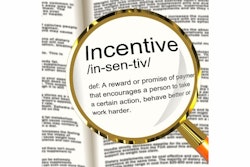
In an industry as fiercely competitive as construction, companies must turn over every rock in search of lower costs. One of the best rocks to look under is the performance bonus.
Designed and managed correctly, bonus systems produce amazing cost savings. They keep everyone focused on doing things right and using time productively. They put money into both the workers' and the owner's pockets. Everybody wins.
Thy Bonus Program Shall Be Fair to ALL
"Did you hear about the new bonus program?"
"Yup."
"What do you think about it?"
"We'll never see any of it."
"Why not?"
"We never make any money on any job. At least, that's what they always tell us."
"Good point. Let's take a break."
Your bonus program must be fair to all parties. If it isn't fair to your workers, they will not work any harder. If it isn't fair to you, your labor costs will rise.
A bonus program must be well balanced in order for it to provide long term, rewards for everyone. That means it needs to include two features:
- It should be paid out for savings the employees have some control over (typically hours used).
- Negative performance must be subtracted from positive performance.
The easiest way to comply with condition No. 2 is to pay out for total performance over the course of a few jobs. When the program is profitability based after subtracting out assigned overhead, the employees usually get short-changed. Be careful when rolling out a profit based system.
If you are like most business owners, you love freedom. Freedom to do what you want. Freedom to spend your time as you want. Freedom to change your mind to whenever you like.
This desire runs counterproductive to a sound bonus program. Bonus programs need to be laid down in black and white that specifically prevents management from altering the plan after the workers have done their part (brought the job in cheaper than budgeted).
Thy Bonus Program Shall Be Crystal Clear
One of the most amazing things about field workers is their ability to know how many hours they've worked and how much money they've made during the current pay period. Guys who often struggle with math become Einstein's when it affects their paycheck.
Your bonus program needs to be simple enough for your workers to track the bonus they'll receive if they maintain the pace they're working at. This is especially important the first couple of years of the plan's existence.
Thy Bonus Program Shall Be Timely
Long delays between successfully completed jobs and bonus payouts kill the motivating power and therefore the cost savings. It breaks the connection between effort and reward.
Paying out every week is likely to cause problems for the owner. You can't take money back from them on the bad jobs. Your payouts should probably be calculated and distributed every month to three months depending on the average length of your projects. Should your jobs typically run 6 months or more on average, pay out at the end of the job.
Thy Bonus Program Shall Be Team Oriented
The biggest fault of most bonus systems is their insistence on rewarding individual employee performance. They create a disincentive for working as a team.
More than likely your workers work in some sort of team (made up of two to seven members). The team succeeds or fails together. More importantly, a team that works together will ALWAYS be more productive than one that doesn't. Use your bonus system to drive teamwork.
Thy Bonus Plan Shall Be Trustworthy
Trust is THE critical success factor of all bonus programs. If your workers don't believe they will receive the bonus they deserve, they will neither work harder nor more intelligently than usual.
If your bonus plan doesn't consistently generate bonuses for your best crew, change it or get rid of it. It's doing more harm than good. Either you've set the bar too high or your estimator is overly optimistic. Neither is a condition prone to motivate your crews.
Make Sure You Get It Right
Designed or managed poorly, bonus plans waste everyone's time and energy; they undermine management's credibility; and they increase costs.
So, while the usefulness of bonus systems is obvious, the complex people issues involved keeps most contractors from implementing successful ones. That or they have a broken job costing system that makes an effective bonus plan impossible.




















